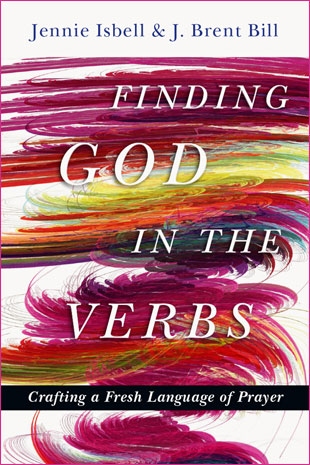" 'You will say, "Christ saith this, and the apostles say this;" but what canst thou say?' That's what George Fox, the person who was the catalyst for the beginning of the Religious Society of Friends (Quakers), once asked a potential follower. It's one of our favorite Quaker quotes. As Brent says:
"It sums up the heart of Quaker experience — that God invites us into direct relationship and experience. And then we are to put it in our words. It reminds us that while the words of the saints and mystics are beautiful and touch on the commonality of the human experience, they are not our words. What can we say that is true to our experience of God?
"While our spiritual ancestors were interactive in their prayers, they are not our prayers. Their prayers were theirs. Their words were theirs. We need to grow our vocabulary to match our vision and experience of God. Prayer is our conversation with God. To rephrase Fox, 'What canst thou pray?'
"One way to grow our verbs is by looking for evidence of God around us — grace-spotting. Brent often does this with his camera — looking through the viewfinder for evidence of God as he walks and is gifted with pictures. As he does this, he makes lists of verbs that could be attributed to God. Walking in the woods or prairie, it's easy for him to see that God is active in creation. As the great gardener (beginning with creation, the garden in Eden, and up through today), God
• plants seeds
• rains upon
• warms
• causes seasons
• feeds the creatures
"These are all words that speak to me because they reflect my own experiences as a steward of creation. I've planted acres of tall-grass prairie with warm-season grass and wildflower seeds. I've carried water to newly planted saplings (we've planted more than twenty thousand!). I watch the seasons and witness their impact on 'my garden.' The trees, grasses, bushes all were planted to provide shelter and food for wildlife. Birds, rabbits, deer and more feast on a multiplicity of berry bushes, nut trees, pawpaw trees, wild cherries, and prairie pollens and seeds.
"Though as a long-time city boy this is all relatively new to me, I am coming to love and care for creation in a new way. And in that love and care I am reminded, as I pray, of two important 'God-verbs' — 'love' and 'care.'
"Jennie, as part of her grace-spotting, prays, 'Lord, give me eyes to see.' In this simple one-line prayer, she confesses that she knows that there is something to see.
"I see evidence of God's presence or God's guidance perceivable by my human eyes if only they can be steadied and opened to see. It is easy to engage this mindset when I am on retreat or having a time of spiritual reflection. In the throes of life, traffic, work stress and family obligations, though, it can be challenging for me to see, or even desire to look for, God's presence in the situation.
"You may do your grace-spotting by seeing God through the actions or words of other people. If that is the case, your list of God-verbs might include
• helps
• inspires
• chastises
• teaches
• causes to laugh
"Because we can't always muster the focus to see the Holy (or even the desire to cultivate our awareness of God's presence), we both find it helpful to have a systematic reflective time of spiritual practice. That's why Brent carries a camera. It's why Jennie keeps a journal and writes poetry. You might want to think of a practice that will help you be more intentional in your grace-spotting. You might even want to carry your journal with you so you can jot down your God-verbs."
